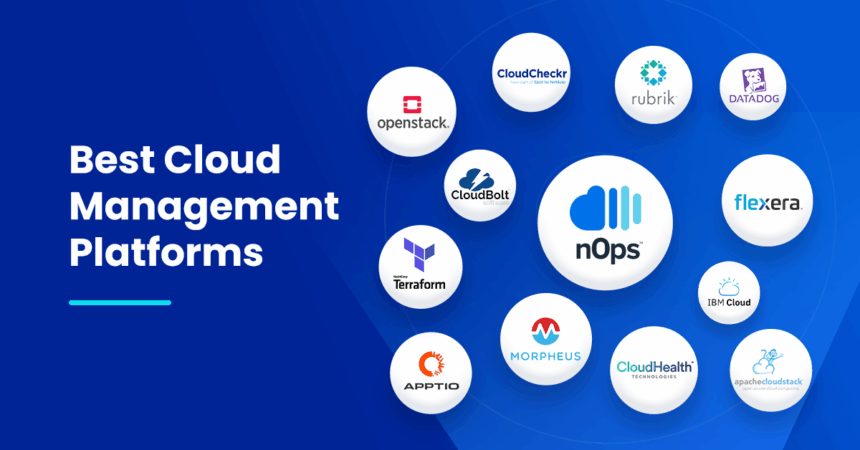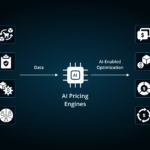In this article, I will discuss the Best Cloud Management Platforms that help organizations manage and optimize their cloud environments.
The platforms provide automated, centralized control and cost management, as well as enhanced security, across multi-cloud environments, including public, private, and hybrid clouds.
Knowing the best coping strategies will help an organization improve the efficiency of its operations and make more informed decisions about cloud infrastructure.
What are Cloud Management Platforms?
A Cloud Management Platform (CMP) is a unified software application that manages, tracks, and optimizes cloud usage in public, private, and hybrid spaces.
It allows businesses to deploy, provision, and govern applications and infrastructure while managing costs, compliance, and security.
CMPs include automation and analytics, workload orchestration, performance monitoring, and provide self-service portals and multi-cloud policy compliance, making multi-cloud management easier for IT Departments.
CMPs reduce unified operational control over disparate clouds. This consolidation simplifies operations, improves scalability, and enhances decision-making and strategy for the cloud business.
Benefits of Cloud Management Platforms
Cost Management: Tracks resource usage and spending to manage and optimize cloud costs.
Budget Management: Monitors and controls cloud spending.
Security Posture Improvement: Enforces compliance and regulatory policies, monitors vulnerabilities, and manages policies across clouds
Scaling & Flexibility: Is able to adjust to new multi-cloud strategies and business demands quickly.
Self-Service Workflow Optimization: Standardized workflows and self-service portals.
Real Time Monitoring: Tracks cloud resource usage and application spending, providing real-time usage patterns.
Best Cloud Management Platforms List
- Scalr: Enterprise-grade CMP offering policy-driven governance, multi-cloud management, and cost optimization.
- CloudBolt: Simplifies hybrid and multi-cloud management with automation, self-service portals, and analytics.
- Morpheus Data: Unified platform for provisioning, orchestration, and lifecycle management across clouds.
- DigitalOcean: Cloud infrastructure platform with simplified deployment, monitoring, and scalable resources.
- Nutanix Prism: Provides centralized management, automation, and analytics for hybrid cloud and hyper-converged infrastructure.
- Abiquo: Hybrid cloud management platform offering multi-cloud orchestration, cost control, and self-service features.
- Embotics: CMP focused on automation, cost efficiency, and workload provisioning across private and public clouds.
- RedHat CloudForms: Open-source CMP enabling hybrid cloud management, compliance enforcement, and resource optimization.
- VMware: Enterprise-grade platform for cloud management, virtualization, automation, and multi-cloud visibility.
- OpenStack: Open-source cloud platform for building and managing public and private clouds with flexible orchestration.
10 Best Cloud Management Platforms
1. Scalr
Scalr is one of the best platforms for cloud management, thanks to its combination of enterprise-grade governance, multi-cloud flexibility, and policy-driven automation.
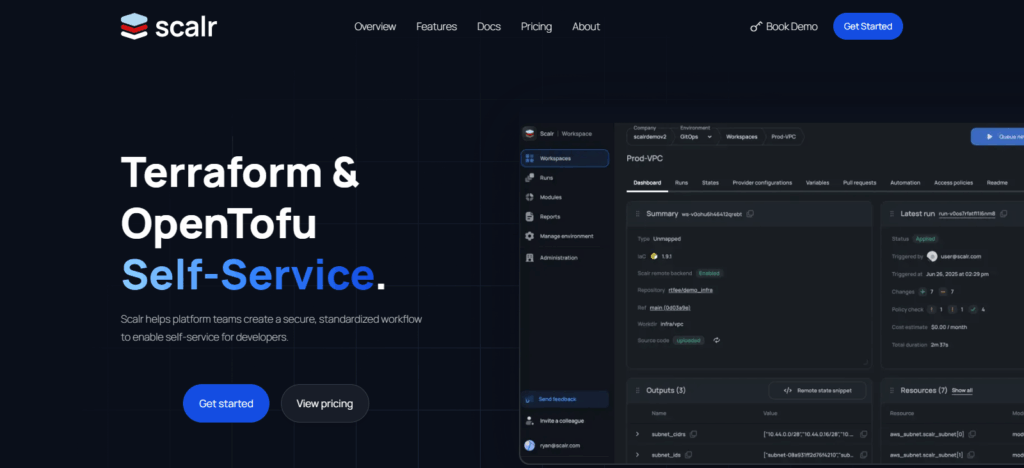
Most platforms do not give Scalr’s level of attention to compliance and cost control during deployment to public and private clouds. Scalr’s account structure, with hierarchical accounts and role-based permissions, is best suited for large enterprises that need tighter control.
Scalr is not fully open source, yet still offers a free trial to allow companies to test its robust features prior to acquisition. Its most notable capability is the blended automation, governance, and simplification, which puts Scalr at the top among enterprises in need of effective, secure, and scalable solutions for cloud management.
Scalr Features
- Policy-Driven Governance: Adds organizational policies and compliance requirements and enforces them in a multi-cloud environment.
- Hierarchical Management: Provides account-based structure control suitable for a major corporation.
- Cost Optimization Tools: Automates monitoring usage and unnecessary spending to savingable thresholds.
2. CloudBolt
CloudBolt ranks among the best Cloud Management Platforms, largely due to its consolidated approach to hybrid and multi-cloud management which combines automation, self-service provisioning, and comprehensive cost analytics on one platform.
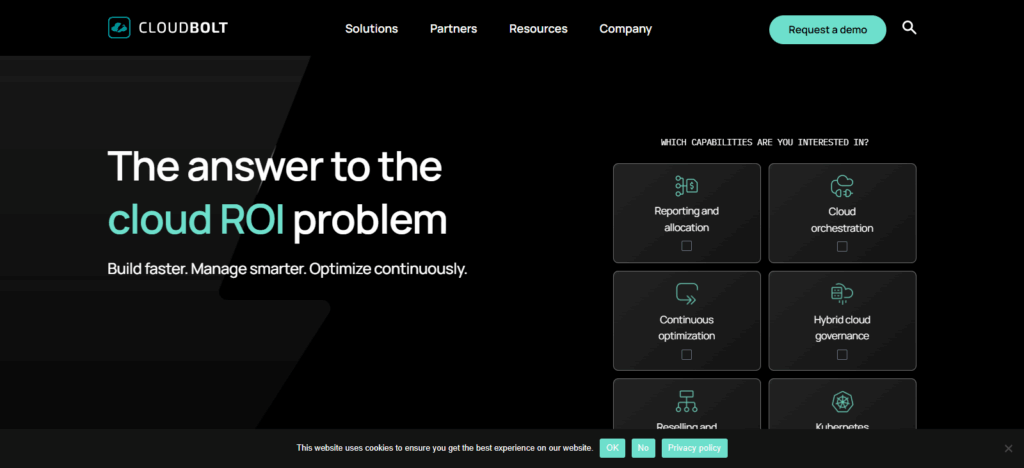
It’s greatest strength is in rapid integration with existing IT systems which helps organizations manage complex environments without disrupting workflows. CloudBolt is proprietary software, though its policy-governed resource optimization, compliance monitoring, and borderless governance capabilities can be tested in its free trial.
CloudBolt’s cloud agnostic visibility and control sysytem makes multi-cloud simplification and orchestration seamless, enabling enterprises to maximize operational efficiency, minimize costs, and scale to meet demand.
CloudBolt Features
- Hybrid Cloud Automation: Combines diverse clouds and automates provisioning for faster deployment.
- Self-Service Portal: Enables user-centric management and self-service for cloud resource provisioning.
- Cost Analytics Dashboard: Offers a payment management mechanism for supervised resource spending and non-utilized resources.
3. Morpheus Data
Morpheus Data has achieved recognition as one of the leading Cloud Management Platforms, thanks to its unique hybrid cloud orchestration and lifecycle management capabilities.
Its bridge between development and operations is unique in the industry and includes integrated tools for provisioning, automation, monitoring, and governance for public, private, and containerized clouds.
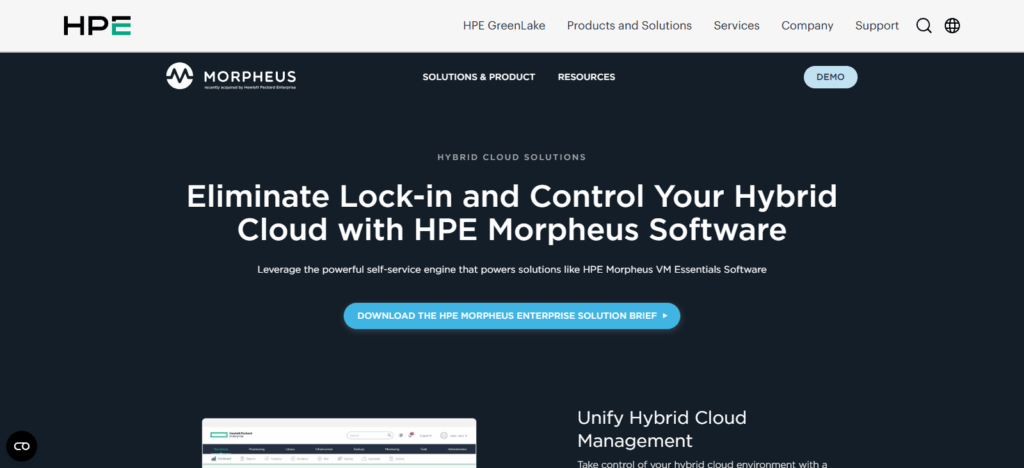
While Morpheus is not open source, it offers free trials for organizations to evaluate its powerful functionality and user-friendly interface.
Its unparalleled combination of multi-cloud visibility, cost optimization, and automation that is friendly to DevOps enables streamlining workflows, maintaining compliance, and scaling cloud infrastructure. This is achieved without sacrificing control, security, and regulatory compliance.
Morpheus Data Features
- Unified Orchestration: Integrates public, private, and containerized cloud systems into a single platform for management.
- Lifecycle Management: Automates the provisioning, scaling, and decommissioning of applications on the cloud.
- DevOps Integration: Facilitates the use of CI/CD tools for a more efficient and faster streamlined workflow on the DevOps lifecycle.
4. DigitalOcean
Digital Ocean has attracted significant attention as a Cloud Management Platform focused on simplicity, ease of use, and scalable infrastructure.
The company excels at making cloud deployment and management easy as compared to enterprise platforms for small businesses, startups, and developers.
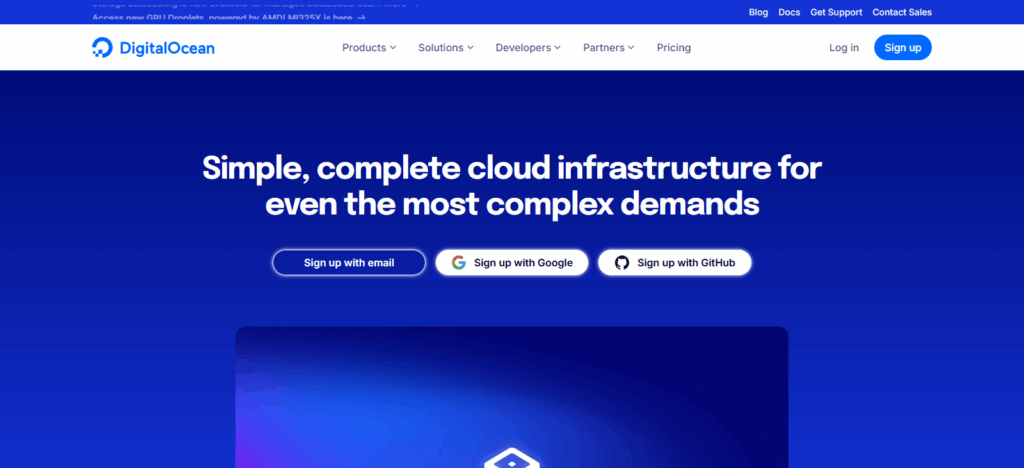
Digital Ocean offers a combination of automated cloud operations and managed services for databases, Kubernetes, and storage, all supplemented with monitoring of cloud resources. Although Digital Ocean is not open-sourced, the company offers a free trial credit to help potential customers explore its services.
The company’s ease of use, predictable pricing, and fast deployment enable it to meet the needs of teams seeking reliable, straightforward cloud management at an affordable price.
DigitalOcean Features
- Developer-Friendly Interface: Offers easy and straightforward control and management of cloud resources via intuitive graphic dashboards.
- Scalable Infrastructure: Provides computing, storage, and networking that are flexible and adjustable to organizational needs.
- Monitoring & Backups: Enables clients to monitor their cloud resources for constant backups and easy recovery.
5. Nutanix Prism
Nutanix Prism is one of the most effective Cloud Management Platforms because of its intelligent infrastructure management and unified visibility over hybrid and multi-cloud environments.
It is uniquely strong in advanced analytics and automation because they simplify performance monitoring, capacity planning, and resolution of issues before they become critical.
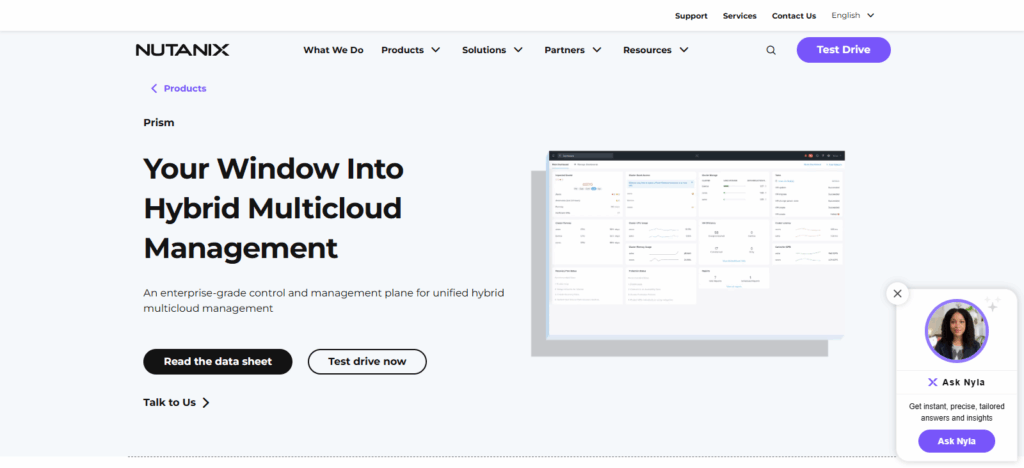
It helps IT teams manage virtualized and cloud resources from a single interface, thereby alleviating operational complexity. Nutanix offers a free trial of Prism so prospective clients can experience its capabilities.
By combining advanced automation, predictive insights, and seamless scalability, Prism enables organizations to improve cloud performance, manage costs, and secure effortless operations.
Nutanix Prism Features
- AI-Driven Insights: Uses AI to monitor and predict performance based on analytics for optimized performance.
- Centralized Management: Controls both cloud and virtual resources through a single management console.
- Self-Healing Systems: Automates routine functions and fixes system faults on an ongoing basis.
6. Abiquo
Abiquo has been recognized as one of the best Cloud Management Platforms for its flexible multi-cloud orchestration and robust self-service capabilities.
The ability to manage diligent control over public, private, and hybrid clouds through one single pane interface is what s Abiquo’s ‘best in class’ capability. Complex cloud operations are significantly simplified through intuitive dashboards and automation tools.

All types of business operations are suitable for this tool. Although Abiquo is not open source, it offers a free trial to evaluate its platform.
The combination of governance, operational efficiency, and the ability to scale is what empowers Abiquo’s users to reduce costs, optimize cloud usage, and secure safe cloud environments.
Abiquo Features
- Unified Cloud Management: Oversees public, private, and mixed cloud environments from a single interface.
- Cost-effective Resource Management: Monitors various cloud resources and minimizes expenditures.
- Self-service Capabilities: Enables users to autonomously implement and control workloads within defined permissions.
7. Embotics
Embotics is recognized as one of the best embotics cloud management platforms due to the automation of its hybrid cloud management processes.
Its strength is in the simplification of the provisioning of workloads, optimization of the costs, and the governance of policy clouds from the private and public cloud systems, which makes it easier for IT systems to operate on complex environment.

Embotics offers detailed analytics and self-service portals that provide users with enhanced visibility and control over their cloud resources.
Embotics cloud management platform is proprietary software, but the company offers free trials for organizations to test its many features. Embotics is able to combine automation, governance, and cost to help other organizations to streamline operations and improve scalability.
Embotics Features
- Sophisticated Automation: Eases the provisioning and administration of workloads and their life cycles.
- Regulatory Compliance: Enforces compliance and governance to every set of cloud activity.
- Expendable Resource Management: Detects and evaluates underlying causes of costs to savings paradox.
8. RedHat CloudForms
RedHat CloudForms has positioned itself as one of the top Cloud Management Platforms, due to its open source nature and mastery of hybrid cloud management capabilities.
A key differentiator is its ability to integrate into existing IT architectures and provide comprehensive automation, governance, and compliance tools across hybrid and multi-cloud IT environments.
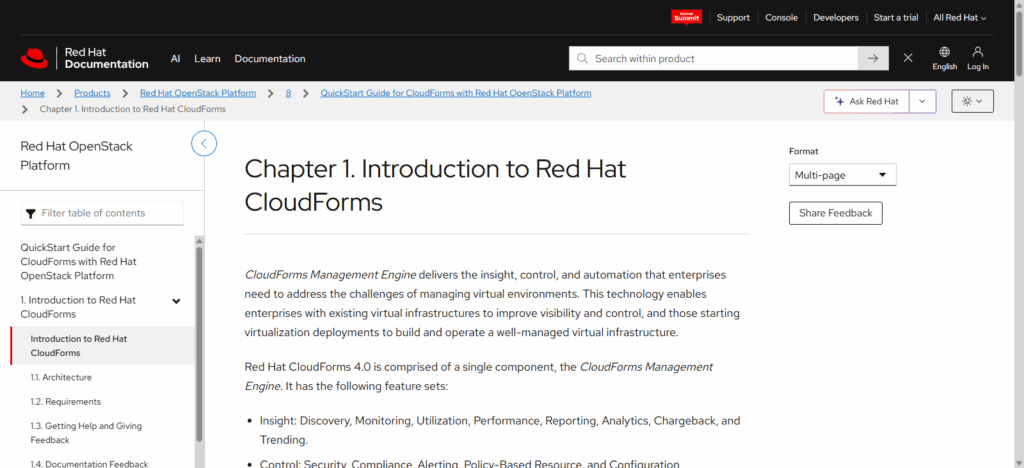
CloudForms delivers cost-effective, policy-driven cloud resource management, workload orchestration, and simplified workload operations, thereby enhancing the security of complex cloud functionality.
Its open-source nature permits the organization to modify and enhance its utility. Apart from this, Red Hat provides a free trial, which is a great opportunity to gauge its diverse capabilities. With its integration of flexibility, visibility, and control, it enables enterprises to flush and agilely optimize and expand cloud infrastructure.
RedHat CloudForms Features
- Customizable Hybrid Cloud Systems: Hybrid cloud manager platform with no vendor lock-in.
- Governance adoption with rules: Resource sscs, compliance, and the security of the flexible and dynamic cloud remains intact.
- Intensive Tracking: Monitors deeply both the workloads and the underlying infrastructure.
9. VMWare
VMware is regarded as one of the finest cloud management platforms available, especially for its virtualization features and enterprise-grade multi-cloud management.
Its differentials features include its ability to effortlessly extend on-premises data centers to public clouds with comprehensive visibility, automation, and policy-based governance.
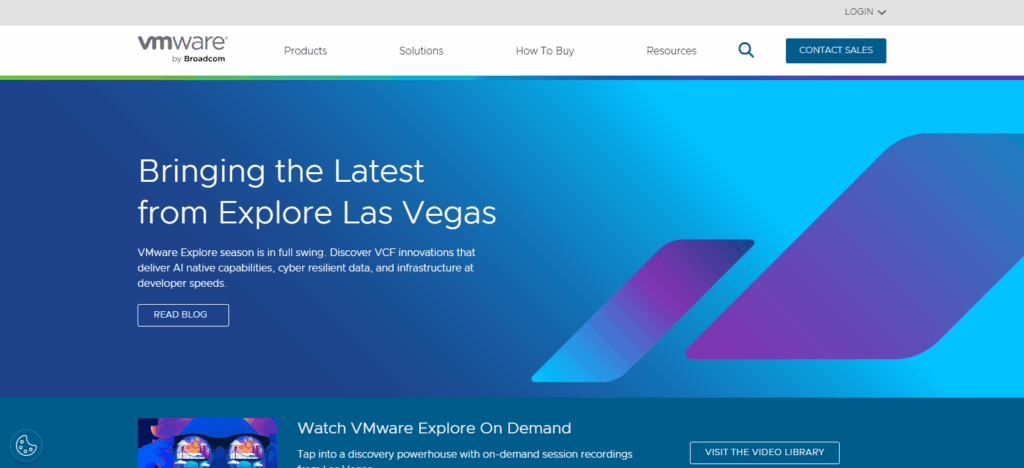
VMware accelerates workload migration, resource optimization and performance tracking which helps it to support complex enterprise infrastructures. VMware is not open-source software, but offers complimentary subscription trials of its platform for prospective business users.
By providing a high level of automation, VMware helps organizations to enhance the availability, security, and overall operational efficiency of IT systems while cutting costs associated with multi-cloud management.
VMware Features
- Seamless Hybrid Cloud Integration: Facilitates connectivity between private and public clouds and on-premise systems.
- Intelligent Automation: Reduces the burden of IT tasks using automation and orchestration.
- Data Regulatory Supervision: Offers unquestionable protection of sensitive information and adherence to regulations.
10. OpenStack
OpenStack is renowned as one of the best Cloud Management Platforms because of its fully open-source design and unparalleled ability to create and manage public, private, and hybrid clouds.
Its true strength is empowering organizations to tailor and manage all elements of their cloud infrastructure, including compute, storage, networking, and orchestration.
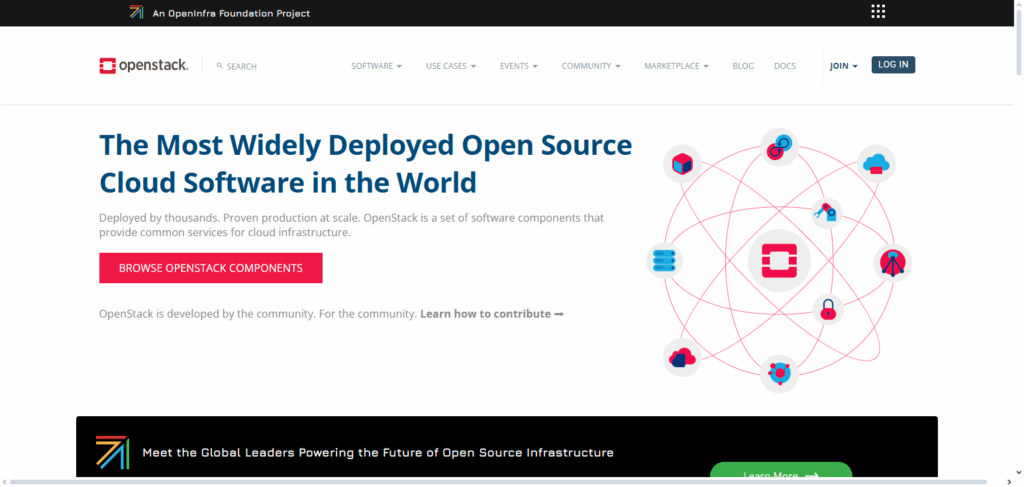
OpenStack is capable of supporting numerous integrations which is ideal for enterprises wanting total control of their cloud environment.
Its open-source nature allows for community-led development of new ideas and many vendors provide free trials to assess its features. OpenStack provides secure, affordable, and efficient cloud management through its high scalability, transparency, and flexibility.
OpenStack Features
- Cloud System Built Using Open Standards: Fully customizable and designed and developed by the community.
- Unrestricted Growth: Grows from a smaller set of clouds to an enterprise-scale system without hindrance.
- Independent Management: Computes, stores, and networks separately, arranged without clumping for manageability.
Pros & Cons
Pros:
- Centralized Control: Administration of hosting facilities which includes private, public and hybrid cloud, from one panel.
- Cost Optimization: Reduction in overall cloud costs by identifying unused or underutilized resources.
- Automation & Efficiency: Reduction in time and resource expenditure on the manual processes of deployment, workload management and scaling.
- Enhanced Security: End-to-End policy enforcement, compliance tracking and cross cloud risk monitoring reduce and protect from multi-cloud compliance security risks¾ensures the multi-cloud security posture is strong.
- Scalability: Proficiency in the management of the workload and changing business demands.
- Improved Visibility: Analytics and dashboards help in tracking resources and provide insights for resource performance.
- Multi-Cloud Flexibility: Supports the smoother functionality of integrating with various cloud providers.
Cons:
- High Implementation Cost: These are expensive to the enterprise and their deployment and maintenance is costly.
- Complex Setup: A necessary degree of skill is required for primary configuration and integration with older system architecture.
- Learning Curve: Gaining complete competency to use all the facilities in the CMP requires training.
- Limited Customization: Deeper configuration or integrations that are commercialized might be restricted.
- Vendor Lock-In Risk: Reduction of flexibility in the future due to the CMP vendor that is depended on, is problematic.
- Performance Overhead: The problems which include latency and resource usage are more dominant in the management of multiple environments from one cloud platform.
Conclusion
In summary, the top Cloud Management Platforms (CMPs) modernize cloud operations by simplifying them and making them more efficient. Primarily, they give organizations consolidated visibility and automate seamless networking, security, and cost controls across hybrid and multi-clouds.
CMPs like Scalr, CloudBolt, Morpheus Data, DigitalOcean, Nutanix Prism, Abiquo, Embotics, RedHat CloudForms, VMware, and OpenStack have tailored unique offerings to various business requirements.
Regardless of enterprise objectives, whether seeking scalability and governance, or open-source flexibility, CMPs offer improved efficiency and superior resource control. The right CMP enhances performance, compliance, and cloud strategy agility. It also optimizes business cloud resource allocation.
FAQ
Why do businesses need a Cloud Management Platform?
CMPs help reduce complexity, control costs, enforce security policies, and automate repetitive tasks—making cloud operations more efficient and transparent.
What is a Cloud Management Platform (CMP)?
A Cloud Management Platform is a software solution that enables organizations to manage, monitor, and optimize cloud resources across public, private, and hybrid environments from a centralized interface.
Are Cloud Management Platforms suitable for small businesses?
Yes, many CMPs like DigitalOcean and CloudBolt offer scalable and cost-effective solutions tailored for small and mid-sized businesses.
Which Cloud Management Platforms are open-source?
OpenStack and RedHat CloudForms are popular open-source CMPs that allow full customization and community-driven innovation.
What features should I look for in a Cloud Management Platform?
Look for automation tools, cost management, policy-based governance, multi-cloud support, scalability, and performance monitoring.




